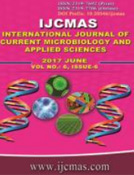


 National Academy of Agricultural Sciences (NAAS)
National Academy of Agricultural Sciences (NAAS)

|
PRINT ISSN : 2319-7692
Online ISSN : 2319-7706 Issues : 12 per year Publisher : Excellent Publishers Email : editorijcmas@gmail.com / submit@ijcmas.com Editor-in-chief: Dr.M.Prakash Index Copernicus ICV 2018: 95.39 NAAS RATING 2020: 5.38 |
The present study aimed to investigate the protective effect of Clerodendrum infortunatum (CI) by targeting its antioxidant properties against liver damage induced by arsenic in rats. Total 18 rats weighting 140-200 g, were divided into three groups. Groups representing control and treatment groups [treated with sodium arsenite alone (3 mg/kg b.w. of rats) and in combination with methanolic extract of CI leaves (100 mg/kg b. w.)]; groups named I, II and III respectively. Sodium arsenite and CI extracts were administered orally, once daily over a period of 28 days. Body wt. of each rats were recorded on day 0, 14 and 28 days of the experiment. At the end of treatment period, liver weight were recorded and their samples were collected for the examination of oxidative stress parameters like superoxide dismutase (SOD) and malondialdehyde (MDA) levels, and liver functioning enzyme marker i.e. ALT and AST. Group I showed the highest increase in final b.wt followed by Group III and then Group II. Significant reduction in liver wt. and SOD levels, and increment in MDA levels were observed in arsenic induced rats. Increase in ALT and AST were observed on arsenic exposure. Our findings suggest that CI may impede the oxidative stress, lowers the liver toxicity enzyme marker level and protect the cells which have been damaged by arsenic toxicity. CI plays a protective role against arsenic-induced toxicity in liver and may potentially be used as a remedial agent.
 |
 |
 |
 |
 |